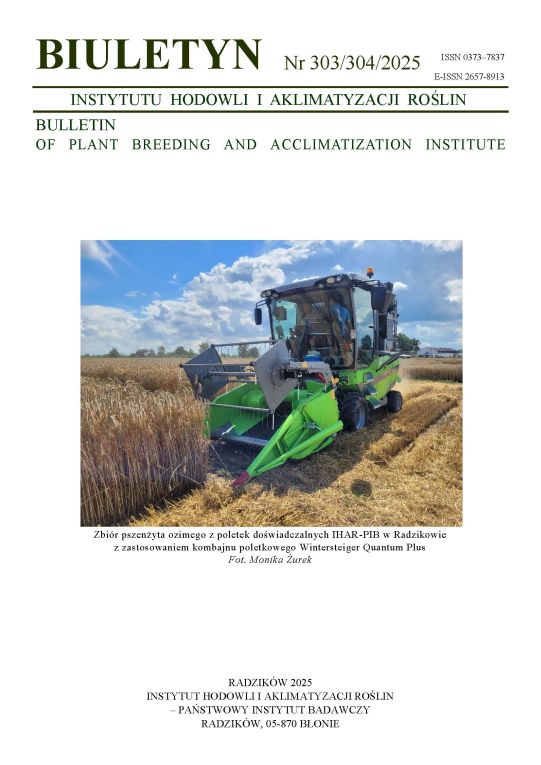The importance of local oat populations with a wide variety of phenotypic traits in relation to breeding process
Grzegorz Kloc
g.kloc@ihar.edu.plInstytut Hodowli i Aklimatyzacji Roślin – Państwowy Instytut Badawczy (Poland)
https://orcid.org/0000-0001-5188-8888
Denise F. Dostatny
Instytut Hodowli i Aklimatyzacji Roślin – Państwowy Instytut Badawczy (Poland)
https://orcid.org/0000-0002-6544-1531
Abstract
Collecting missions are among the most important sources of collecting materials at the National Center for Plant Genetic Resources (KCRZG). The choice of Lithuania as a place to search for genetic resources was associated with historical relations with Poland. In the years 2011 - 2013 three collecting missions took place, collecting 32 accessions of Avena sativa L. with passport data. Collected samples were sown on 2.5 m2 plots at Radzików IHAR in 2012, 2013, 2014. 600 seeds were manually sown on each plot. During observations, plant lodging andemerging diseases were noted, and thousand grain weight and yield was calculated. For most accessions, panicles appeared later than in reference varieties. Local objects in this category were higher than the reference objects and had a low lodging degree. Local oat can be a source of individual, unique traits for breeding.
Keywords:
oat, collecting missions, gene resourcesReferences
Bioversity International. (2015). The history of Bioversity International collecting missions.: http://www.bioversityinternational.org/e-library/databases/collecting-missions/history/(dostęp: październik 2019).
Google Scholar
Iannucci, A., Codianni, P., Cattiveli, L., (2011). Evaluation of Genotype Diversity in Oat Germplasm and Definition of Ideotypes Adapted to the Mediterranean Environment. International Journal of Agronomy: 1–8.
Google Scholar
Kordulasińska, I., Bulińska-Radomska, Z., (2014). Ocena cech morfologicznych, użytkowych i składu chemicznego obiektów owsa zgromadzonych w Krajowym Centrum Roślinnych Zasobów Genowych w Radzikowie. Polish Journal of Agronomy, 16: 3–12.
Google Scholar
Łapiński, B., Nita, Z., Szołkowska, A., Wieczorek, P., (2013). Mieszaniec owsa uprawnego z dzikim gatunkiem Avena macrostachya jako nowe źródło zmienności do poprawy jakości plonu owsa nagoziarnistego. Biuletyn IHAR, 270: 43–54.
Google Scholar
Nita, Z. T., (2003). Współczesne osiągnięcia i perspektywy hodowli owsa w Polsce. Biuletyn IHAR, 229: 13–20.
Google Scholar
Pszczółkowski, P., Sawicka, B., (2016). Zmienność form i odmian owsa w Polsce. Polish Journal of Agronomy 27: 106–117.
Google Scholar
Rocha, F., Gaspar, C., Barata, A. M., (2017). The legacy of collecting missions to the valorisation of agro-biodiversity. Agriculture & Foresty, vol 63, issue 2: 25–38.
Google Scholar
Trading Economics. https://tradingeconomics.com/poland/agricultural-land-percent-of-land-area-wb-data.html.
Google Scholar
Trading Economics. https://tradingeconomics.com/poland/temperature.
Google Scholar
Trading Economics. https://tradingeconomics.com/lithuania/agricultural-land-percent-of-land-area-wb-data.html.
Google Scholar
Trading Economics. https://tradingeconomics.com/lithuania/temperature (dostęp: październik 2019).
Google Scholar
Authors
Grzegorz Klocg.kloc@ihar.edu.pl
Instytut Hodowli i Aklimatyzacji Roślin – Państwowy Instytut Badawczy Poland
https://orcid.org/0000-0001-5188-8888
Authors
Denise F. DostatnyInstytut Hodowli i Aklimatyzacji Roślin – Państwowy Instytut Badawczy Poland
https://orcid.org/0000-0002-6544-1531
Statistics
Abstract views: 264PDF downloads: 260 PDF downloads: 52
License

This work is licensed under a Creative Commons Attribution-ShareAlike 4.0 International License.
Upon submitting the article, the Authors grant the Publisher a non-exclusive and free license to use the article for an indefinite period of time throughout the world in the following fields of use:
- Production and reproduction of copies of the article using a specific technique, including printing and digital technology.
- Placing on the market, lending or renting the original or copies of the article.
- Public performance, exhibition, display, reproduction, broadcasting and re-broadcasting, as well as making the article publicly available in such a way that everyone can access it at a place and time of their choice.
- Including the article in a collective work.
- Uploading an article in electronic form to electronic platforms or otherwise introducing an article in electronic form to the Internet or other network.
- Dissemination of the article in electronic form on the Internet or other network, in collective work as well as independently.
- Making the article available in an electronic version in such a way that everyone can access it at a place and time of their choice, in particular via the Internet.
Authors by sending a request for publication:
- They consent to the publication of the article in the journal,
- They agree to give the publication a DOI (Digital Object Identifier),
- They undertake to comply with the publishing house's code of ethics in accordance with the guidelines of the Committee on Publication Ethics (COPE), (http://ihar.edu.pl/biblioteka_i_wydawnictwa.php),
- They consent to the articles being made available in electronic form under the CC BY-SA 4.0 license, in open access,
- They agree to send article metadata to commercial and non-commercial journal indexing databases.
Most read articles by the same author(s)
- Denise Fu Dostatny, Grzegorz Kloc, Wiesław Podyma, The importance of landraces in agricultural landscape and in modern agriculture research , Bulletin of Plant Breeding and Acclimatization Institute: No. 283 (2018): Special issue
- Denise Fu Dostatny, Grzegorz Kloc, Wiesław Podyma, Grzegorz Hodun, Rola wyjazdów kolekcyjnych w gromadzeniu zasobów genowych Krajowego Centrum Roślinnych Zasobów Genowych The role of collection missions in gathering plant genetic resources material for National Polish Gene Bank , Bulletin of Plant Breeding and Acclimatization Institute: No. 283 (2018): Special issue
- Denise Fu Dostatny, Grzegorz Kloc, Inventory, collection and use of crop wild relatives resources , Bulletin of Plant Breeding and Acclimatization Institute: No. 283 (2018): Special issue














